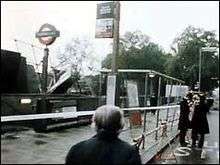1975 Piccadilly bombing
| 1975 Piccadilly bombing | |
|---|---|
| Part of the Troubles | |
 Aftermath of the bombing | |
| Location | Piccadilly, London |
| Date |
9 October 1975 21:00 (GMT) |
| Target | British people |
Attack type | Time Bomb |
| Weapons | gelignite bomb |
| Deaths | 1 |
Non-fatal injuries | 20 |
| Perpetrators | Provisional IRA |
Suspected perpetrators | Provisional IRA's Balcombe Street Gang |
On Thursday 9 October 1975, a bomb attack just outside Green Park Underground station in the City of Westminster, London, left one man dead and injured 20 others. The attack was carried out by terrorists from the Provisional IRA's Balcombe Street Gang. The attack occurred during a period of heightened activity by the IRA in England and in particular London.[1]
Background
The Irish Troubles, the religious and political conflict in Northern Ireland, had been ongoing since the late 1960s. The conflict greatly intensified after January 1972 when British paratroopers shot dead 14 Irish nationalists and injured 14 others on what became known as Bloody Sunday. After Bloody Sunday recruits flooded in to join mostly the Provisional IRA but also the less active Official IRA. Until February 1972 the conflict largely remained in Northern Ireland, with the violence sometimes spilling into the Republic of Ireland, but in revenge for Bloody Sunday the Official IRA bombed the headquarters of the British Parachute Regiment, killing seven civilian workers. In March 1973 the Provisional IRA bombed England for the first time when they bombed the Old Bailey courthouse in the centre of London, killing one person and injuring over 200.
During summer 1974 the IRA launched a string of attacks in England, which included a letter bomb campaign and the bombing of Westminster Hall.[2][3] In October 1974 a new, more intense bombing campaign was launched in England by the IRA Active Service Unit known as the Balcombe Street gang. This new bombing offensive began on 5 October 1974 when the IRA bombed two pubs in Guildford, killing 5 people and injuring 65 others.[4] A month later in November 1974 they bombed a pub in Woolwich often used by soldiers killing 2 people & injuring 40.[5]
In February 1975 the IRA agreed to a long term truce with the British government.[6] The truce officially lasted until January 1976, but the IRA broke the truce on 27 August 1975 when they bombed a pub in Caterham, Surrey injuring over 30 people.[7] A month before the bombing outside Green Park station, the IRA unit bombed the Hilton Hotel in London on 5 September 1975 which killed two people and injured over 60 others.[8]
The bombing
At around 21:00 GMT on 9 October 1975, a bomb thrown at a bus stop just outside Green Park Underground station exploded, killing a homeless man (23-year-old Graham Ronald Tuck), who died of a heart attack after suffering severe head and chest injuries. 20 other people, including two children, were injured; the majority of the injuries were the result of flying glass hitting passers-by. The force of the blast threw pedestrians off their feet, shattered shop windows across the road and blew cars onto the pavement.
The attack occurred almost exactly one year after the Guildford pub bombings in October 1974. The force of the explosion threw cutlery and glassware from the dining tables in the Ritz Hotel. Customers escaped injury because the main restaurant, which bore the brunt of the blast, had been emptied to make way for a wedding reception earlier that day.[9][10][11]
Aftermath
The IRA's bombing campaign in London would continue their campaign killing several more people and injuring dozens more in bomb and gun attacks. The worst of these was the bombing at Walton's restaurant in November which killed 2 people and injured over 20 others.[12] The active service unit was caught at the siege of Balcombe Street in December 1975 ending its campaign in London.[13]
See also
References
- ↑ "One Killed and 18 Hurt In Piccadilly Bombing". The New York Times. 1975-10-10. Retrieved 2018-05-22.
- ↑ "CAIN: Chronology of the Conflict 1974". Cain.ulst.ac.uk. Retrieved 2018-05-22.
- ↑ "CAIN: Chronology of the Conflict 1974". Cain.ulst.ac.uk. Retrieved 2018-05-22.
- ↑ "CAIN: Chronology of the Conflict 1974". Cain.ulst.ac.uk. Retrieved 2018-05-22.
- ↑ "CAIN: Chronology of the Conflict 1974". Cain.ulst.ac.uk. Retrieved 2018-05-22.
- ↑ "CAIN: Chronology of the Conflict 1975". Cain.ulst.ac.uk. Retrieved 2018-05-22.
- ↑ "CAIN: Chronology of the Conflict 1975". Cain.ulst.ac.uk. Retrieved 2018-05-22.
- ↑ "CAIN: Sutton Index of Deaths". Cain.ulst.ac.uk. 1975-09-05. Retrieved 2018-05-22.
- ↑ "On This Day: 1975: Man killed in Piccadilly bomb blast". BBC News. 1988-10-09. Retrieved 2018-05-22.
- ↑ "CAIN: Sutton Index of Deaths". Cain.ulst.ac.uk. 1975-10-09. Retrieved 2018-05-22.
- ↑ "CAIN: Chronology of the Conflict 1975". Cain.ulst.ac.uk. Retrieved 2018-05-22.
- ↑ "CAIN: Chronology of the Conflict 1975". Cain.ulst.ac.uk. Retrieved 2018-05-22.
- ↑ "CAIN: Chronology of the Conflict 1975". Cain.ulst.ac.uk. Retrieved 2018-05-22.